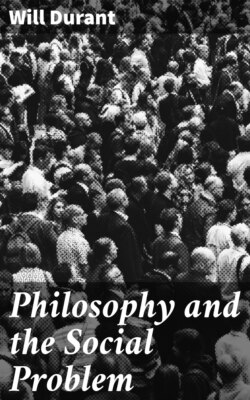Читать книгу Philosophy and the Social Problem - Уилл Дюрант - Страница 13
На сайте Литреса книга снята с продажи.
VII
“Instinct” and “Reason”
ОглавлениеAND now to go back to the refutations.
The strongest objection to the Socratic doctrine is that intelligence is not a creator, but only a servant, of ends. What we shall consider to be our good appears to be determined not by reason, but by desire. Reason itself seems but the valet of desire, ready to do for it every manner of menial service. Desire is an adept at marshalling before intelligence such facts as favor the wish, and turns the mind’s eye resolutely away from other truth, as a magician distracts the attention of his audience while his hands perform their wonders. If morality is entirely a matter of intelligence, it is entirely a question of means, it is excluded irrevocably from the realm of ends.
The conclusion may be allowed in substance, though it passes beyond the warrant of the facts. It is true that basic ends are never suggested by intelligence, reason, knowledge; but it is also true that many ends suggested by desire are vetoed by intelligence. Why are the desires of a man more modest than those of a boy or a child, if not because the blows of repeated failure have dulled the edge of desire? Desires lapse, or lose in stature, as knowledge grows and man takes lessons from reality. There is an adaptation of ends to means as well as of means to ends; and desire comes at last to take counsel of its slave.
Be it granted, none the less, that ends are dictated by desire, and that if morality is intelligence, there can be no question of the morality of any end per se. That, strangely, is not a refutation of the Socratic ethic so much as an essential element of it and its starting-point. Every desire has its own initial right; morality means not the suppression of desires, but their coördination. What that implies for society we shall see presently; for the individual it implies that he is immoral, not when he seeks his own advantage, but when he does not really behave for his own advantage, when some narrow temporary purpose upsets perspective and overrides a larger end.[16] What we call “self-control” is the permanent predominance of the larger end; what we call weakness of will is instability of perspective. Self-control means an intelligent judgment of values, an intelligent coördination of motives, an intelligent forecasting of effects. It is far-sight, far-hearing, an enlargement of the sense; it hears the weakened voice of the admonishing past, it sees results far down the vista of the future; it annihilates space and time for the sake of light. Self-control is coördinated energy—which is the first and last word in ethics and politics, and perhaps in logic and metaphysics too. Weak will means that desires fall out of focus, and taking advantage of the dark steal into action: it is a derangement of the light, a failure of intelligence. In this sense a “good will” means coördination of desires by the ultimate desire, end, ideal; it means health and wholeness of will; it means, literally, integrity. In the old sense “good will” meant, too often, mere fear either of the prohibitions of present law or of the prohibitions stored up in conscience. Such conscience, we all know, is a purely negative and static thing, a convenient substitute for policemen, a degenerate descendant of that conscientia, or knowing-together, which meant to the Romans a discriminating awareness in action—discriminating awareness of the whole that lurks round the corner of every part. This is one instance of a sort of pathology of words—words coming to function in a sense alien to their normal intent. Right and wrong, for example, once carried no ethical connotation, but merely denoted a direct or tortuous route to a goal; and significantly the Hebrew word for sin meant, in the days of its health, an arrow that had missed its mark.
But, it is urged, there is no such thing as intelligence in the sense of a control of passion by reason, desire by thought. Granted; it is so much easier to admit objections than to refute them! Let intelligence be interpreted as you will, so be it you recognize in it a delayed response, a moment of reprieve before execution, giving time for the appearance of new impulses, motives, tendencies, and allowing each element in the situation to fall into its place in a coördinated whole. Let intelligence be a struggle of impulses, a survival of the fittest desire; let us contrast not reason with passion, but response delayed by the rich interplay of motive forces, with response immediately following upon the first-appearing impulse. Let impulse mean for us fruit that falls unripe from the tree, because too weak to hang till it is mature. Let us understand intelligence as not a faculty superadded to impulse, but rather that coördination of impulses which is wrought out by the blows of hard experience. The Socratic ethic fits quite comfortably into this scheme; intelligence is delayed response and morality means, Take your time.
It is charged that the Socratic view involves determinism; and this charge, too, is best met with open-armed admission. We need not raise the question of the pragmatic value of the problem. But to suppose that determinism destroys moral responsibility is to betray the mid-Victorian origin of one’s philosophy. Men of insight like Socrates, Plato, and Spinoza, saw without the necessity of argument that moral responsibility is not a matter of freedom of will, but a relation of means to ends, a responsibility of the agent to himself, an intelligent coördination of impulses by one’s ultimate purposes. Any other morality, whatever pretty name it may display, is the emasculated morality of slaves.
